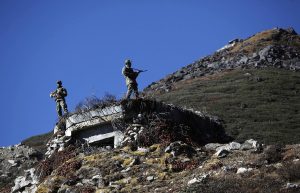Sudha Ramachandran
 Is the list aimed at warning India against hosting an upcoming air combat exercise with the U.S., where Japan will participate as an observer?
Is the list aimed at warning India against hosting an upcoming air combat exercise with the U.S., where Japan will participate as an observer?The Chinese government has released a list of what it calls “standardized geographical names” for 11 places in Arunachal Pradesh, along with a map depicting much of this Northeast Indian state as part of what it refers to as “Zangnan,” the southern part of the Tibet Autonomous Region.
The list, which China’s Ministry of Civil Affairs released on April 2, provides coordinates of two residential areas, five mountain peaks, two rivers and two other areas, all in Arunachal Pradesh, and their names in Chinese characters, Tibetan and pinyin.
The Chinese move is yet another attempt by Beijing to strengthen its claims over Indian territory in the eastern sector of the disputed Sino-Indian border i.e. in Arunachal Pradesh. As the noted Tibetologist Claude Arpi told The Diplomat last year: “This is part of the propaganda to assert China’s claims.”
India reacted with a strong statement in response to the Chinese renaming of Indian places. “We reject this outright. Arunachal Pradesh is, has been, and will always be an integral and inalienable part of India,” the Ministry of External Affairs (MEA) said in a statement, adding that “attempts to assign invented names will not alter this reality.”
China claims around 90,000 sq km of territory in northeastern India i.e., almost the entire state of Arunachal Pradesh. During the 1962 India-China war, the PLA occupied chunks of Indian territory in the eastern and western sectors. While it retained control of Aksai Chin in the western sector, it withdrew from the territory it had occupied in the eastern sector. For several decades thereafter Beijing focused on consolidating its control over Aksai Chin and Tibet and it was only in the mid-1980s that it began asserting claims over Arunachal Pradesh.
In addition to periodic military ingressions into Arunachal Pradesh — the one at Tawang on December 9 of last year, for example — China has asserted its claims over the territory by vociferously objecting to any Indian move to consolidate its control over the state. Visits by Indian leaders, as well as the Tibetan spiritual leader the Dalai Lama to Arunachal Pradesh, have triggered strong responses from Beijing. The Chinese government has also refused to issue visas for Indians from Arunachal Pradesh and blocked loans from multilateral banks for development projects in the state on the grounds that this is disputed territory.
Assigning Chinese names to places in Arunachal Pradesh is part of this strategy.
The Chinese government maintains that “Zangnan has been China’s territory since ancient times.” Chinese analysts contend that India “illegally occupied” this area and gave places there “illegal names.” “The right to name places in the region should [therefore] belong to China,” according to Zhang Yongpan, a research fellow at the Institute of Chinese Borderland Studies of the Chinese Academy of Social Sciences in Beijing. China’s “standardization of place names” in Arunachal completely “falls within China’s sovereignty,” Global Times cited him as saying.
The Chinese government has assigned Chinese names to places in other areas where it claims territory, as in the South China Sea. In April 2020, its Ministry of Natural Resources and the Ministry of Civil Affairs released a list of Chinese names for 80 islands, reefs, and ridges, along with their coordinates. “The standardization [of names] reflected China’s sovereignty over these listed islands in the South China Sea and their surrounding waters,” Qian Feng, a senior fellow at the Taihe Institute and director of the research department of the National Strategy Institute at Tsinghua University in Beijing, was quoted as saying at that time by Global Times.
Relations between India and China have been extremely strained in recent years, especially since June 2020, when their soldiers clashed violently at the Galwan Valley in the western sector of the Line of Actual Control. The two armies are reported to have disengaged from several “friction points.” But tensions continue to run high. Although the epicenter of the current military stand-off is the Western sector, China’s interest in Arunachal Pradesh remains high as evident from the ingression at Tawang in December last year.
China released the first list of “standardized names” on April 13, 2017, two days after the Dalai Lama ended a week-long visit to Arunachal Pradesh. Chinese media had warned of serious consequences if India did not stop the Tibetan leader’s visit. A few months later, the Indian and Chinese armies were locked in a 73-day standoff at Doklam near the China-India-Bhutan trijunction.
The second list of “standardized names,” which was announced on December 30, 2021, came amid heightened border tensions. Importantly, it came two days before a new Chinese border law. The law is seen in New Delhi as a move to formalize Chinese intrusions into Indian territory since April 2020 and also, strengthen Chinese claims over disputed territory.
What is the significance of the timing of the latest Chinese list of “standardized names” for Indian places?
In November 17-December 2, 2022, India and the U.S. participated in a high-altitude joint military exercise at Auli, which is less than 100 km from the LAC in the middle sector. China’s ingression at Tawang, which followed a week later, was seen as retaliation for the India-U.S war games in the Himalayas.
Between April 10 and 21, the Indian Air Force and the U.S. Air Force will be participating in major air combat wargames at the Kalaikunda airbase in West Bengal. The “Cope India” exercise will see Japan participate as an “observer.”
With its latest list of Chinese names for Indian place names in Arunachal Pradesh has Beijing sent out another warning to India?
No comments:
Post a Comment